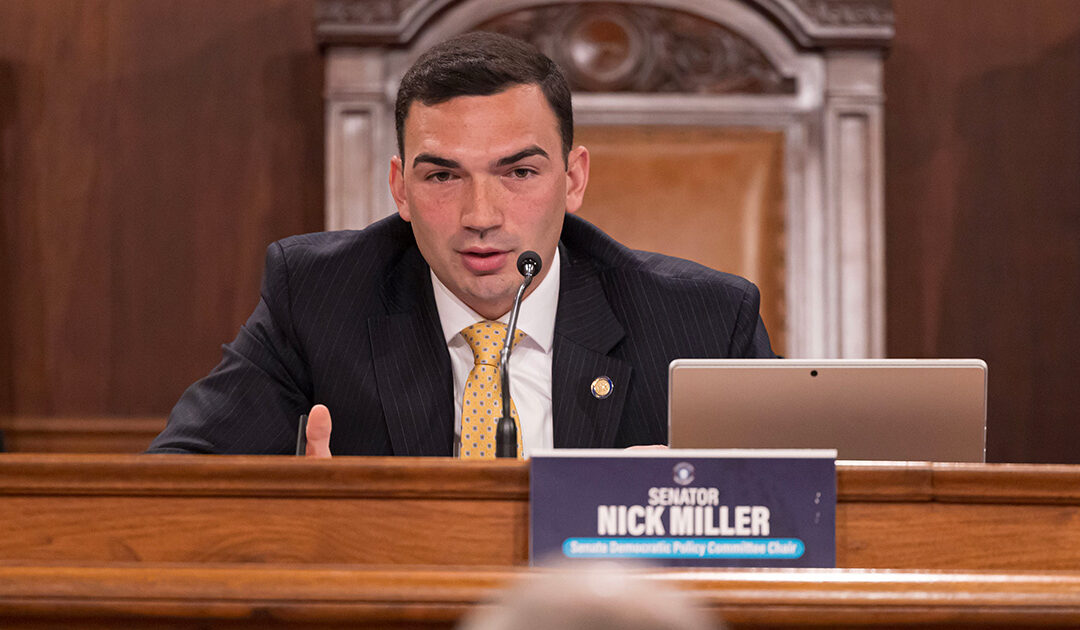HARRISBURG, PA − March 31, 2025 − Today, Senate Democratic Policy Committee Chair Nick Miller held a hearing to explore strategies for mitigating the impact of energy costs on residents along with legislative solutions aimed at delivering reliable, affordable energy for both now and in the future.
“Energy affordability is crucial for the economic stability of families and small businesses. High costs strain household budgets and have a broader impact on local economies,” said Senator Miller. “We must find solutions to address generation, regulations, and innovative solutions for the future of energy in Pennsylvania.”
“Energy affordability remains a pressing concern for Pennsylvanian families. While Pennsylvania’s energy resources help keep costs relatively competitive, many households and industries still struggle with rising energy prices,” said Senator Marty Flynn. “Factors like infrastructure, market volatility, and federal regulations all impact affordability, making it crucial that we continue to pursue balanced energy policies that support both economic growth and consumer protection.”
“As Pennsylvania’s electricity landscape continues to evolve, the PUC remains focused on ensuring resource adequacy through continued engagement with PJM, utilities, and stakeholders to address emerging grid reliability challenges; fostering a competitive electricity market that provides affordable and transparent options for consumers; and enforcing strict supplier oversight to ensure that Pennsylvanians are protected from deceptive marketing and unfair business practices,” said Stephen DeFrank, PUC Chairman.
Adam Walters, the Senior Energy Advisor of Pennsylvania Department of Community and Economic Development, emphasized the importance of state intervention. He explained that Governor Shapiro’s Lightning Plan aims to meet energy demands while incorporating more clean power generation resources into the grid across the Commonwealth.
“Each of these pieces of the Lightning Plan seeks, in multiple ways, to address the fundamental challenge I noted at the outset – the power market is not generating optimal outcomes for Pennsylvanians,” Adam Walters said. “A failure to act now will jeopardize Pennsylvania consumers through runaway costs on their utility bills and put us in a competitively disadvantaged position for attracting new businesses. Luckily, we currently have a unique opportunity to play a key role in bringing stability.”
“Before the OSBA establishment in 1998, small businesses lacked representation in PUC matters,” said NazAarah Sabree, Pennsylvania’s Small Business Advocate. “While residential and low-income consumers had dedicated advocates and large commercial industrial consumers had private legal representation – small business were left without a voice resulting in a disproportionate share of rate increases.”
“Pennsylvania and the wider region will need to build new reliable sources of generation to keep costs down,” said Robert Routh of Pennsylvania Climate & Energy – National Resources Defense Council. “Adam walked through the six bills in Governor Shapiro’s Lightning Plan, and as we wait for the official text for each of those bills to dive into the details. Based on the concepts that we have heard and the deep understanding of the problems that this legislative packaged is designed to solve – we are highly encouraged and eager to see the texts.”
“Diversifying our grid with clean energy and modern transmission is essential to achieving lower costs—and Pennsylvania is behind much of the country in this regard,” said Chris D’Agostino of Advanced Energy United. “For instance, states like Texas, where 30% of electricity comes from renewables, compared to less than 5% in Pennsylvania, enjoy lower average electricity rates. Clean energy and affordability go hand in hand.”
“Pennsylvania could also find ways to encourage technologies that make the heating and cooling process itself more energy efficient,” said Seth Blumsack of Center for Energy Law and Policy, Penn State University. “Clean and efficient thermal energy technologies such as geothermal heating and cooling have broad potential in Pennsylvania and are reflected in some aspects of Governor Shapiro’s lightning plan.”
The panelists for today’s hearing included:
-
Adam Walters, Senior Energy Advisor, PA Department of Community and Economic Development
-
NazAarah Sabree, Small Business Advocate, Commonwealth of Pennsylvania Office of Small Business Advocate
-
Robert Routh, Policy Director, Pennsylvania Climate & Energy, National Resources Defense Council
-
Chris D’Agostino, Pennsylvania Policy Principal, Advanced Energy United
-
Seth Blumsack, Director, Center for Energy Law and Policy, Penn State University
Senator Nick Miller was elected Policy Chair of the Senate Democratic Caucus in December 2024. Today’s hearing was his third as Chair.
Footage of the hearing, as well as the written testimony of the panel, is available at PASenatorMiller.com/Policy. Photographs and downloadable video are available upon request.
######
Testimony
Panel 1 – An Overview of Our Energy Outlook and Regulatory Oversight
Panel 2 – The Administration’s Lightning Plan and Consumer/Small Business Education
- NazAarah Sabree, Small Business Advocate, Commonwealth of Pennsylvania Office of Small Business Advocate
Panel 3 – Innovative Energy Solutions
-
Robert Routh, Policy Director, Pennsylvania Climate & Energy, National Resources Defense Council
-
Chris D’Agostino, Pennsylvania Policy Principal, Advanced Energy United
-
Seth Blumsack, Director, Center for Energy Law and Policy, Penn State University

